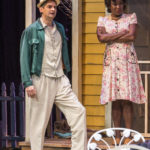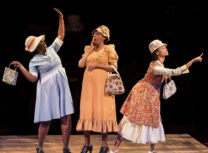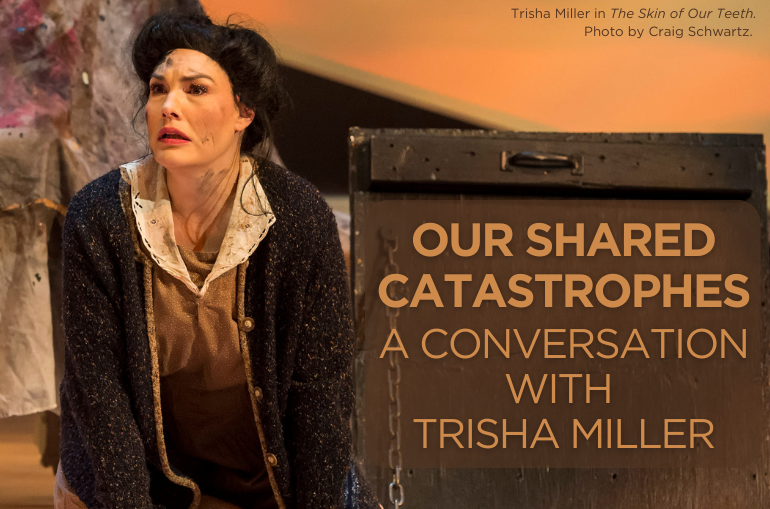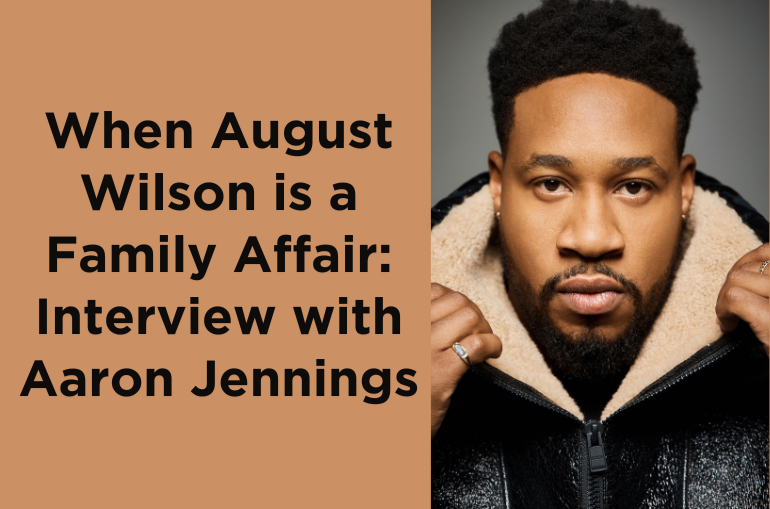OWNING THE ROLE!
By A Noise Within
October 21, 2015
Good actors always inhabit their roles. But All My Sons gets under one’s skin even more than most: it touches the players as deeply as it does our patrons. Here our cast shares their thoughts on their characters, and their answers show how piercing Miller’s play really is.

What most attracted you to your character the first time you read All My Sons?
George is a very principled person with a keen sense of justice who is also very passionate. I identified with that.
What role does your character play in the grander scheme of the play?
George is the catalyst for the explosive climax and tragic resolution of the play. Thematically he represents the past and nagging truth the Kellers have tried desperately to ignore.
What makes this play so relevant and moving, 70 years after it was first written? How does All My Sons speak to you?
The events and themes of this play seem ripped from current headlines. Many of the themes are universal. Self-deception is how most of us maintain any form of happiness. We still and sadly always will be tempted to compromise our ideals, ethics, or morality for the sake of money or self-interest. All the while rationalizing our behavior to justify our actions. Specific to our country, we have a religion of money and of business, which offers easy support for these rationalizations. Arthur Miller also happens to have written a masterpiece, which doesn’t hurt.
Secrets and lies are important in this play. What lies does your character keep, and how do these affect others, near and (if applicable) far?
George wants to believe in his father’s innocence and Joe’s guilt because Joe promised to take responsibility. It’s easier to have someone to blame than it is to believe one’s father is capable of such a thing, a sentiment George has in common with Chris. No matter which way you slice it, Steve Deever participated in the decision to ship the cracked cylinder heads and deserves to be in prison, in my personal opinion.
What is the favorite (or most meaningful) line you deliver, and why?
“Because I thought you believed it. That’s the truth Chris. I believed everything because I thought you did.” This line reveals just how devastating this whole ordeal has been to George. He’s utterly vulnerable in this moment. His world was held together until this point because he could still find solace in his ideals and that his ideals were shared by Chris, whom in many ways is like a brother. And in spite of his pride and competitiveness with Chris, he’s telling him just how much he’s looked up to him, and just how bad it all hurts.
Why will our audiences take your character—and the play—to heart?
If you’ve ever had your ideals shattered, or your pride hurt, or felt impotent rage at injustice in your community, country, or world at large, you will understand George and you will be deeply affected by this play.
MAEGAN McCONNELL, Ann Deever
What most attracted you to your character the first time you read All My Sons?
How real she and all the characters are. Ann is written so well…there are so many sides of her. She’s light-hearted and sentimental, pretty and lively, unforgiving and forgiving, selfless and selfish. She is flawed as people are. It’s so interesting to find and figure out how to play those nearly opposite traits.
What makes this play so relevant and moving, 70 years after it was first written? How does All My Sons speak to you?
The play examines “doing what’s right”…and the effect that action (or lack of action) takes on the people involved. That is certainly as relevant today as it was in 1950. Lack of morality in business certainly has not gone away…corporate greed is even more prevalent today than when this play was written.
Secrets and lies are important in this play. What lies does your character keep, and how do these affect others, near and (if applicable) far?
Ann keeps secret the letter until she feels she is forced to share it with the family.
What is the favorite (or most meaningful) line you deliver, and why? I’m not sure, but when Ann say, “He’s got to read this.” It’s a turning point in the show.
Why will our audiences take your character—and the play—to heart?
I think audiences might relate to Ann because she just wants to be happy. She makes choices—sometimes selfish ones—that she believes will get her what she wants. Who hasn’t done that? Audiences will be able to relate to the whole family and neighborhood. It’s America and they will be able to see themselves in all of these people.
JEREMY RABB, Dr. Jim Bayliss
 What most attracted you to your character the first time you read All My Sons?
What most attracted you to your character the first time you read All My Sons?
His wry humor and touching self-awareness. I wasn’t expecting this easy-talking, clever neighbor to so readily reveal his inner demons with such plainness and vulnerability.
What role does your character play in the grander scheme of the play?
He stands as a cautionary tale for Chris. Jim’s is the safe, practical path that Chris so desperately wants to avoid. Living a life based on someone else’s needs (his wife’s) has left Jim deeply bitter and disenchanted. Though once a passionate dreamer eager to make a real impact on the world of medicine, he’s now a lifeless man whose only priority is making enough money for his family. He forces us to consider whether we have a greater responsibility to others’ happiness or to our own, and whether some sort of healthy balance is even possible.
What makes this play so relevant and moving, 70 years after it was first written? How does All My Sons speak to you?
The corporate malfeasance we read about regularly is a direct result of the blinding self-interest that is as widespread and as resonant now as it was in the 40s. On a more personal level, the impact of Joe’s and Kate’s stubborn self-delusion helps reinforce what happens in the absence of empathy in our everyday interactions with the people around us. It’s a trait often overlooked and undervalued, but without it, we all risk becoming as oblivious and self-destructive as the Kellers.
Secrets and lies are important in this play. What lies does your character keep, and how do these affect others, near and (if applicable) far?
Jim is fairly straightforward about what’s on his mind. He’s very open about the soul-crushing frustration he suffers from not being able to live the life he wants. His utmost desire is to defy his wife and achieve something more significant and beneficial for the world than simply making enough money. His lies don’t hurt him; his unflinching honesty does. It further alienates him from his wife, sending her into deeper grief and greater acts of desperation.
What is the favorite (or most meaningful) line you deliver, and why?
“These private little revolutions always die.” Jim is lamenting how people who experience the epiphany of casting off their current lives in exchange for something more significant and life-changing inevitably burn out and revert to their usual cowardly ways once reality sets in. The unforgiving starkness with which he expresses this is particularly touching since Jim himself is the poster boy for that very pattern and he knows it.
Why will our audiences take your character—and the play—to heart?
Jim, along with the other characters, reflects that very human need to try to balance our hopes and dreams with the realities that surrounds us. Circumstances arise that often force us to choose one over the other, resulting in potential conflict either within ourselves, with those around us or both.
JUNE CARRYL, Sue Bayliss
What most attracted you to your character the first time you read All My Sons?
What strikes me most about Sue is how funny she is. Granted, I think she laughs to keep from crying. As Joe points out, Sue is a realist. She knows her husband is unhappy, that her hold on him is tenuous, and that he is trapped by the fact that he is a good husband. Like Joe and Kate, she is incredibly destructive. She digs in and keeps hold; but she is humanized by her capacity for laughter.
What role does your character play in the grander scheme of the play?
I feel like Sue represents the kind of selfishness that drove Joe to hide under the covers and Kate to hide in denial. We see in her the embodiment of desperation that makes one shortsighted and incapable of appreciating consequences. She has to live with these people and she tries to drive a wedge between them and her husband which can only end badly. In the sequel to the play I picture Jim moving out after learning what she’s said to Ann.
What makes this play so relevant and moving, 70 years after it was first written? How does All My Sons speak to you?
This is a very American play. There is a brand of greed which is very particular to the American psyche. It has to do, I think, with what it means to make good here. Joe is still the terrified child put out at ten years of of age. The bubble of 2008, Enron, all the way back to the institution of slavery as a foundation of the American economy: we haven’t cornered the market on greed, certainly. But want drives us in a way here that is unlike anywhere else in the world, perhaps because wealth’s attainability here and the lack of a caste system (at least a formal one). The play is incredibly timely.
Secrets and lies are important in this play. What lies does your character keep, and how do these affect others, near and (if applicable) far?
Sue is terrified of ending up alone, but she would never let Jim know that. Instead, she nags and cajoles and keeps him on a short leash.
What is the favorite (or most meaningful) line you deliver, and why?
My favorite line is, “You can never owe somebody without resenting them.” It just speaks volumes about Sue’s view of relationships and to the brutal clarity of her situation with Jim.
Why will our audiences take your character—and the play—to heart?
Sue is complicated. She makes you laugh and then does this horrifying thing to Ann, then makes you laugh again. The whole play is like that. Really affable people who are absolutely horrifying and monstrous and tragic.
E.K. DAGENFIELD, Frank Lubey
 What most attracted you to your character the first time you read All My Sons?
What most attracted you to your character the first time you read All My Sons?
What is appealing about Frank is his sincerity and enthusiasm. He’s a bit of a dope, and has a tendency to put his foot in his mouth from time to time, but there is a guilelessness to him that is very charming. I don’t often have the privilege of playing genuine, sweet characters, so Frank is an exciting challenge.
What role does your character play in the grander scheme of the play?
Frank’s belief in and knowledge of astrology is one of the many things Kate clings to as proof of the possibility that her son is alive. Frank, who narrowly aged out of the draft twice and in doing so was able to get married, have three children, and pay off his house, also serves as a foil to George, Ann, and Chris, who are left deeply scarred by WWII and who struggle to get on with their lives.
What makes this play so relevant and moving, 70 years after it was first written? How does All My Sons speak to you?
For me the central theme is responsibility—to oneself, to one’s friends and family, to strangers, to society, to the world—and the way these individual and distinct responsibilities conflict and even directly oppose each other is something that is intrinsic to every human life. Miller’s characters so starkly embody this that that All My Sons is a play that will always be fresh and relevant to audiences. The more tangible elements of the play are also immanent: we live in a world where a story about corporate irresponsibility is rarely absent from the newspapers, where every day soldiers return to their families and have difficulty assimilating back into civilian life, where families struggle to reconcile their actions to each other. Having spent months with this play, I still am not sure I can blame any of the characters for being selfish or for making the decisions they make, and that really speaks to me.
Secrets and lies are important in this play. What lies does your character keep, and how do these affect others, near and (if applicable) far? I am not sure that Frank has any real secrets or lies, but I do think that he allows himself, and allows Kate, to put too much trust in astrology because it reinforces the hope that Larry might be alive somewhere. On some level Frank has to know that a soldier that has been missing for three years isn’t likely to return home, but still he persists with Kate in believing the possibility that Larry could pull up in the driveway at any moment. Frank feels that these thoughts bring comfort to a grieving mother, even though in reality Kate’s delusion is tearing her family apart.
What is the favorite (or most meaningful) line you deliver, and why?
I don’t know that I have a favorite line, but I do enjoy saying “Gee Whiz!” It’s a phrase that nowadays you don’t hear exclaimed without sarcasm, and it can sound a little dated or creaky, but the strength of Arthur Miller’s dialogue keeps it natural. It’s a bit of a challenge for an actor, also, to deliver that sort of line with the sincerity it deserves.
Why will our audiences take your character—and the play—to heart?
I don’t know about my character, but the play as a whole, and our production in particular, is simply a masterwork. I have watched it umpteen times in rehearsal and yet last night when I snuck into the balcony after my final exit to watch the last twenty minutes of the show, I couldn’t help but find myself incredibly moved by the story again. The aching humanity of the Keller family, brought to rare and beautiful life by my colleagues, is unmistakable, and truly satisfies an intangible part of the soul, as all great tragedies do.
VEGA PIERCE-ENGLISH, Bert
What most attracted you to your character the first time you read All My Sons?
I like how innocent Bert is and also honest. He is kind of fearless and has a clear sense of right and wrong.
What role does your character play in the grander scheme of the play?
I believe Bert is very important to the theme of the play. Generally, his character provides comic relief but also his being in the play highlights Joe (Keller’s) true character. It’s ironic that one of the most innocent characters in the play is interacting with the least innocent character. Bert feeds Mr. Keller’s ego and his scenes hint at Mr. Keller’s guilt.
What makes this play so relevant and moving, 70 years after it was first written? How does All My Sons speak to you?
There are so many hidden mysteries in it—in the characters and in the plot itself—and it’s a smart story too. It was smart for Arthur Miller to keep you guessing about Mr. Keller’s guilt but if you pay attention to the dialogue you can figure out his hidden character. Although I haven’t experienced anything like the characters in this play, it is a great tragedy. Before you know it is a true story, you already feel like it could have been.
Secrets and lies are important in this play. What lies does your character keep, and how do these affect others, near and (if applicable) far?
Bert doesn’t keep any secrets … but at the end of his last scene he does suspect that Mr. Keller is not a real policeman and that there isn’t a jail!
What is the favorite (or most meaningful) line you deliver, and why?
“…Then why don’t you ever arrest anybody?” I like this line because I think it puts a guilty thought in Mr. Keller’s head.
Why will our audiences take your character—and the play—to heart?
Everyone has done something that they regret and hope that the people they love never find out about it.
See them on stage!All My Sons runs in repertory through November 21st. Please click here for tickets.








